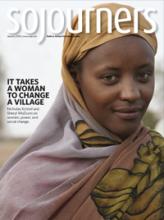Last April, 10 civil society organizations across Kenya, under the banner “Gender 10,” initiated a rather unusual mass action: a sex strike. In the wake of the post-election violence that rocked the country in early 2008 and produced a coalition government with two chief executives, the government was mired in inertia and public bickering, while vigilante groups still roamed the countryside.
Fed up, Gender 10—which encompassed women’s policy and advocacy groups, children’s rights organizations, and the Federation of Kenyan Women Lawyers—urged all women in Kenya to abstain from sex with their husbands and partners for an entire week until the politicians got their act together. A special appeal went out to both first ladies, Lucy Kibaki and Ida Odinga. “An extraordinary situation calls for an extraordinary measure,” the Gender 10 press statement read.
The result was that Parliament was convened one week after the boycott, while the cabinet met the second week. A government task force was set up to address the insecurity caused by the vigilantes.
And there were other benefits, according to Ann Njogu, executive director of the Centre for Rights, Education, and Awareness in Nairobi. “What the boycott did was to create a debate in this country. People actually talked about sex in public for the first time.” Apart from breaking the political impasse, the boycott “brought out openly the prejudices that exist in our society: that women have no right to say no, that women can be raped in marriage, and that divorced women are less of a citizen.”
These are just a few of the issues that Kenyan women’s groups are facing in a country where only 10 percent of Parliament is female; where rape victims seeking justice have faced daunting legal as well as societal hurdles; where widows and other vulnerable people are often deprived of their legal inheritances; and where women in HIV-affected families are too often stigmatized and marginalized.
Read the Full Article

